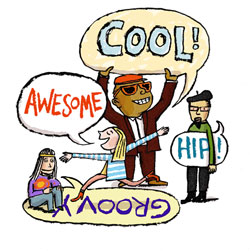 Why do some words take hold in the public consciousness and persist through generations while others fall by the wayside after one season?
Why do some words take hold in the public consciousness and persist through generations while others fall by the wayside after one season?
Despite the fleetingness of many new slang terms, such as txtnesia (“when you forget what you texted someone last”), a visit to the Urbandictionary will undoubtedly amuse at the inventiveness of our our language., though gobsmacked and codswallop may come to mind as well.
[div class=attrib]From State:[end-div]
Feeling nostalgic for a journalistic era I never experienced, I recently read Tom Wolfe’s 1968 The Electric Kool-Aid Acid Test. I’d been warned that the New Journalists slathered their prose with slang, so I wasn’t shocked to find nonstandard English on nearly every line: dig, trippy, groovy, grok, heads, hip, mysto and, of course, cool. This psychedelic time capsule led me to wonder about the relative stickiness of all these words—the omnipresence of cool versus the datedness of groovy and the dweeb cachet of grok, a Robert Heinlein coinage from Stranger in a Strange Land literally signifying to drink but implying profound understanding. Mysto, an abbreviation for mystical, seems to have fallen into disuse. It doesn’t even have an Urban Dictionary entry.
There’s no grand unified theory for why some slang terms live and others die. In fact, it’s even worse than that: The very definition of slang is tenuous and clunky. Writing for the journal American Speech, Bethany Dumas and Jonathan Lighter argued in 1978 that slang must meet at least two of the following criteria: It lowers “the dignity of formal or serious speech or writing,” it implies that the user is savvy (he knows what the word means, and knows people who know what it means), it sounds taboo in ordinary discourse (as in with adults or your superiors), and it replaces a conventional synonym. This characterization seems to open the door to words that most would not recognize as slang, including like in the quotative sense: “I was like … and he was like.” It replaces a conventional synonym (said), and certainly lowers seriousness, but is probably better categorized as a tic.
At least it’s widely agreed that young people, seeking to make a mark, are especially prone to generating such dignity-reducing terms. (The editor of The New Partridge Dictionary of Slang and Unconventional English, Tom Dalzell, told me that “every generation comes up with a new word for a marijuana cigarette.”) Oppressed people, criminals, and sports fans make significant contributions, too. There’s also a consensus that most slang, like mysto, is ephemeral. Connie Eble, a linguist at the University of North Carolina, has been collecting slang from her students since the early 1970s. (She asks them to write down terms heard around campus.) In 1996, when she reviewed all the submissions she’d received, she found that more than half were only turned in once. While many words made it from one year to the next, only a tiny minority lasted a decade.
[div class=attrib]More from theSource here.[end-div]
[div class=attrib]Image courtesy of Slate.[end-div]
